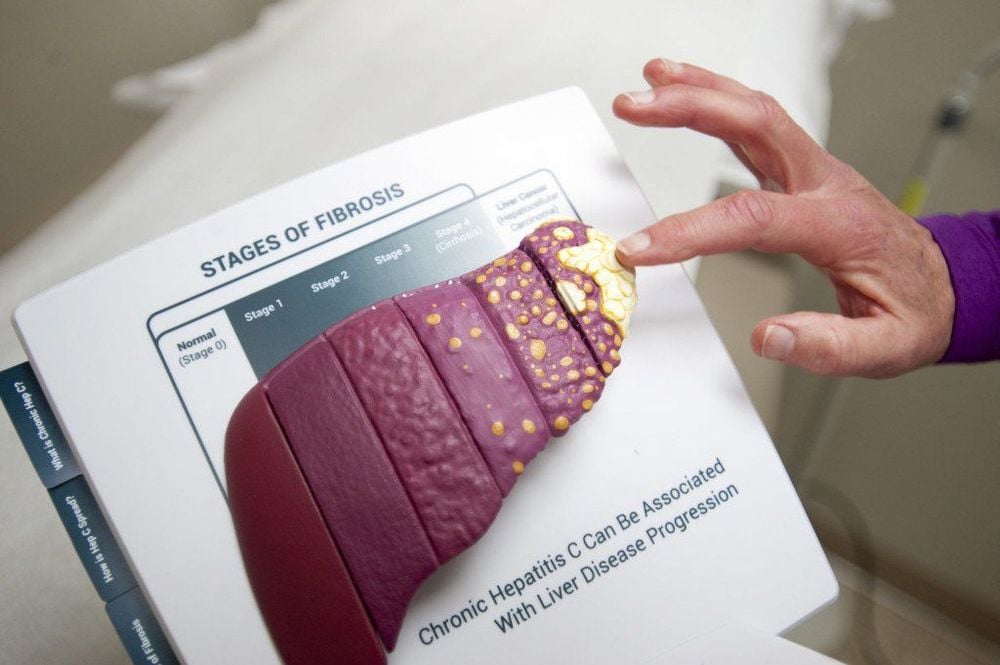This is an automatically translated article.
The article was professionally consulted by Dr. Mang Thi Phuong Mai - Department of Medical Examination & Internal Medicine - Vinmec Nha Trang International General HospitalWhen infected with Hepatitis C, the patient often does not notice the typical symptoms of the disease, if left for many years, it will lead to cirrhosis, liver failure or complications into liver cancer, so it is necessary to have regular screening. years to detect the disease.
1. Subjects at risk of hepatitis C
Hepatitis C is a disease that is transmitted from a carrier of the hepatitis C virus to a healthy person in 3 ways: blood, sex, and mother-to-child transmission. In particular, the risk of hepatitis C virus infection through blood accounts for the highest rate, the mother-to-child transmission rate accounts for about 5%.
Those most at risk include:
People with organ transplants or blood transfusions You can get the hepatitis C virus if you have had an organ transplant or simply have a blood transfusion, using sharing needles or getting a tattoo in an unclean environment with equipment that is not well disinfected.
Frequent contact with samples containing the hepatitis C virus If you work often in a medical environment such as a clinic, hospital and have a lot of contact with infected needles, blood, dialysis machine, it is very easy to become infected. become victims of the hepatitis C virus.
Infection from other sources Groups of people who inject drugs are at high risk because they share injection equipment without guaranteed sterilization. Or people who have sex with many different objects such as prostitutes, homosexuals or people with many partners...
Therefore, for normal healthy people, who are not at risk, it should be investigated. control once a year. As for people in high-risk groups such as infected husband or wife, blood product contact, medical staff, surgery, injection, etc., they should be screened every 3 to 6 months. . In particular, people who have regular hemodialysis, drug addicts, and sexually promiscuous people should be tested every 1 to 3 months for early detection and treatment plan.
2. Can hepatitis C cause death?
Hepatitis C has 2 stages: acute hepatitis C and chronic hepatitis C. In fact, in the chronic stage of hepatitis C will lead to cirrhosis, liver failure or complications into liver cancer, this is the leading cause of death in people with hepatitis C.
However, now has been There are oral drugs with very high efficiency (over 95%) and safety (almost no side effects), so if treated early, the disease can be completely cured. But if treatment in the cirrhosis stage is less effective, complications can still occur.

Viêm gan C mãn tính có thể dẫn đến xơ gan, suy gan, thậm chí là ung thư gan
3. Symptoms of hepatitis C
Hepatitis C is called the "silent killer" because the virus often hides in the body for many years. Most people have no warning signs of hepatitis C, so they won't get treatment until years later. When hepatitis C has symptoms or a diagnosis is made, the disease has caused many negative health effects.
Symptoms of acute hepatitis C: People with acute hepatitis C usually do not have any symptoms (symptoms). However, some people will have mild to severe symptoms after being infected with the virus, including:
-Tiredness, loss of appetite: This is a fairly common sign in people with acute hepatitis C. Infected people have this symptom because the hepatitis C virus directly attacks the immune system, thereby making the patient tired, lazy, afraid to move even when lying down.

Mệt mỏi, chán ăn do virus viêm gan C tấn công trực tiếp vào hệ miễn dịch
-Slight fever: This is one of the manifestations of hepatitis C, this fever symptom can last long or occur in episodes. Usually, patients are quite ignorant when they have this sign because they think it's just the weather or a common cold.
-Yellow skin, itching or yellow eyes: In the early stages, this symptom rarely appears. The cause of this symptom is the hepatitis C virus, which slows down the functioning of the liver, affecting its ability to filter out harmful toxins from the body, thereby causing high levels of bilirubin in the blood. This will cause yellowing of the eyes and skin in the patient.
In addition to the above symptoms, the patient may also have some other hepatitis C symptoms, such as: Muscle aches; Pain in the upper right part of the abdomen; Muscle or joint pain; Nausea or Vomiting; Stomach pain, weight loss; Dark yellow urine, pale stools; Easy bleeding, easy bruising.
Symptoms of chronic hepatitis C: Most patients with chronic hepatitis C have no symptoms. People who have been infected with the hepatitis C virus for many years can damage the liver. In many cases, there are no symptoms until complications develop.
In asymptomatic patients, hepatitis C is often detected by blood liver enzyme tests (ALT, AST) that are found to be elevated, and up to a quarter of people with chronic hepatitis C continue to have symptoms. cirrhosis or severe scarring of the liver. These people may also have other symptoms, including swelling in the legs and abdomen, and a buildup of toxins in the blood that can lead to brain damage.
However, hepatitis C symptoms vary from person to person. There are people who have the disease but do not have any symptoms or symptoms are very faint, not enough to recognize. In fact, many people have the disease for years without even knowing it. Therefore, only specialized tests allow the diagnosis and classification of hepatitis caused by the hepatitis C virus.
Please dial HOTLINE for more information or register for an appointment HERE. Download MyVinmec app to make appointments faster and to manage your bookings easily.













